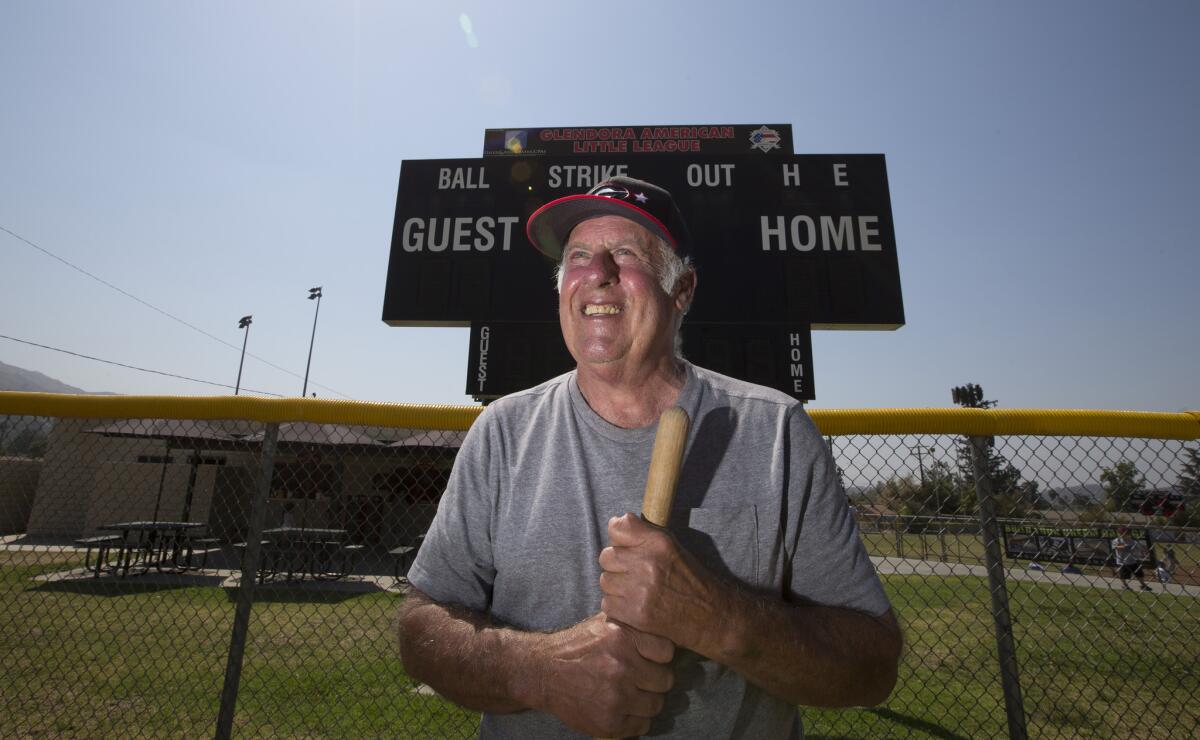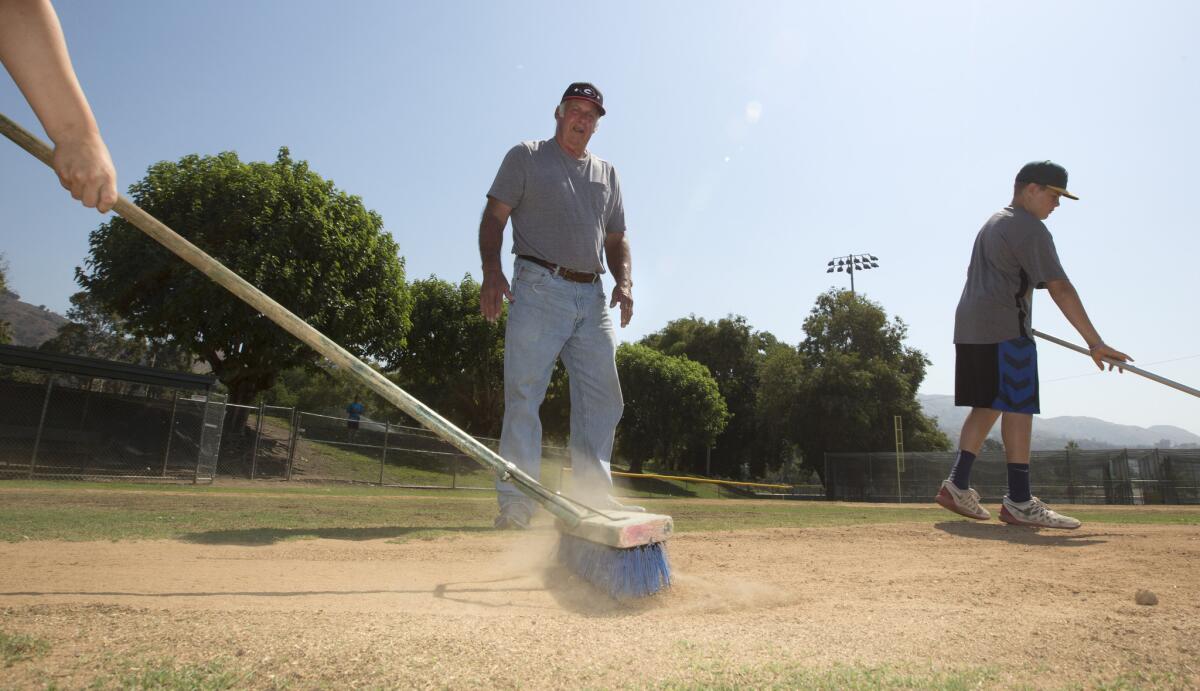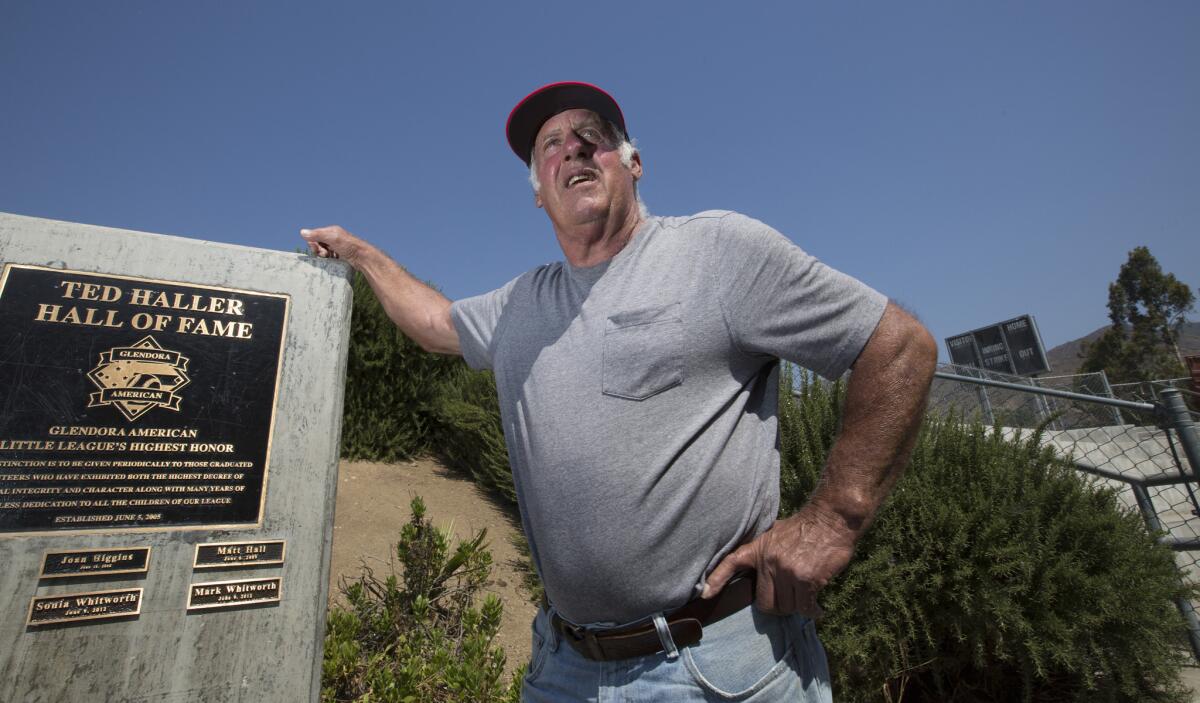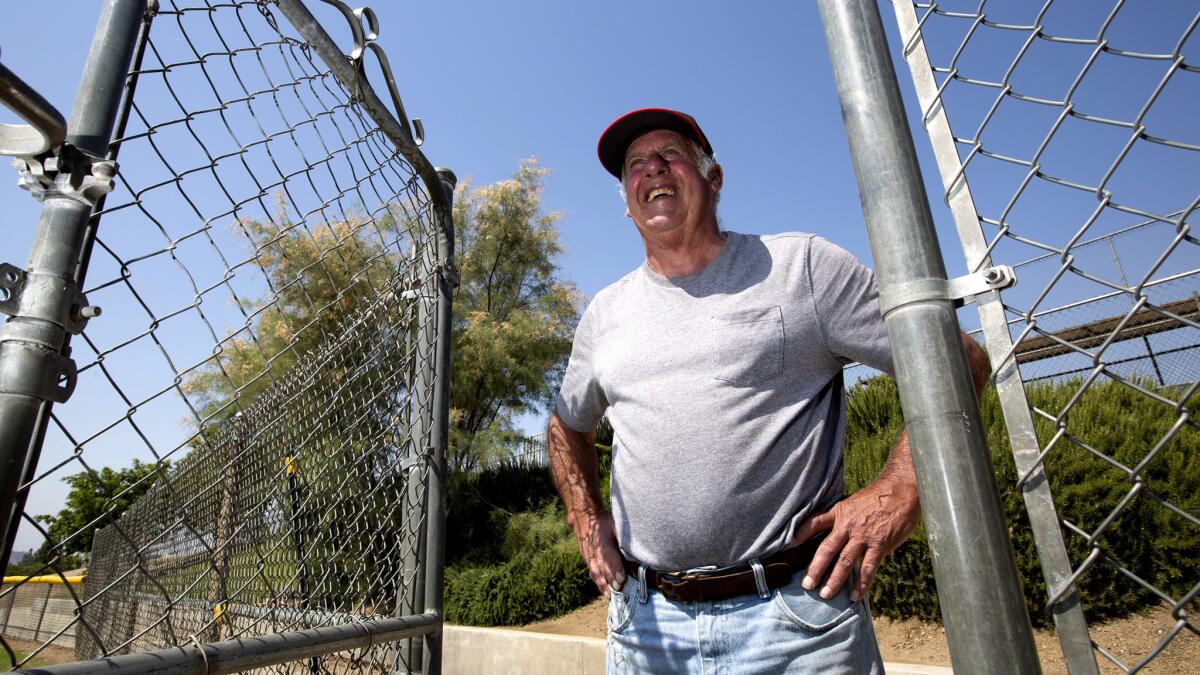Column: Groundskeeper Ted Haller built a Little League community from the ground up in Glendora

- Share via
The numbing whirl of a John Deere. The gentle swish of a sprinkler. The rhythmic raking of dirt.
“That’s my music,” says Ted Haller, sitting on a lawn tractor in his steamy and cluttered cinder-block shed.
The rumbling roll of a wheelbarrow. The light sprinkling of paint. The first clank of a hard shovel into a soft pitching mound.
“I’ll be sitting on my lawn mower with a cup of coffee and listening to some of those things and I’ll be like, yeah,” he says.
For 37 years, Ted Haller has labored to a different sort of baseball soundtrack. His chorus doesn’t come from the game, but from the fields used for the games, the six diamonds he has tended as the volunteer field maintenance director for the Glendora American Little League.
For more than half of his life, this 66-year-old man with scruffy white hair and a perpetually sunburned face has officially been a groundskeeper. But for two generations of Glendora households whose children have grown up here, he’s been much more than that. He’s been a trust-keeper, a friend-keeper, a family-keeper. He has built, dug, mowed, fertilized, watered, raked and turned a nondescript grassy patch in east Glendora into a deep green canvas upon which thousands of neighborhood children have begun to paint the story of their lives.
My only passion is for watching kids have a great time playing the game.
— Ted Haller

“You mention Ted Haller in any grocery store in Glendora and somebody will know him,” says Bruce Hunt, longtime league manager and current board member. “He’s touched countless people in our community in so many ways.”
He has done this without much conversation or companionship. He never married, he has no children, he has no hobbies. His living room is the deep-green shed, and his life is on those fields, at least a couple of hours a day, often much more, virtually every day of the year, even during the five months when there is no baseball being played upon them.
“Can’t just let the fields die,” Haller says with a shrug.
So Haller has kept the fields alive, helped keep this league alive, nearly 400 kids every summer, from T-ballers to 12-year-olds, worried parents and sweating umpires and those nice moms making rumpled change at the snack bar, all of them hanging out at Ted’s place.
None of them, however, are there at 8 a.m. on a sweltering weekday afternoon in June as he tries to fix a sprinkler. None of them are there when he’s mowing on a Thanksgiving morning or Christmas Day. Few of them are left when he leaves the fields every night after dark to return to his Covina condo, where for years he would grab a few hours sleep before resuming his daily paying job as a construction worker.
“All year long, you look out to the diamonds and there he is, Ted riding alone on that mower,” says Mike Gorski, former league president and longtime league board member. “This is his home.”
For 37 years, Ted Haller has been accompanied mostly by the music of his fields, although this spring those songs were occasionally interrupted with questions. As he has grown older, slowed down, reached the end of his career, he has occasionally wondered.
Can anybody else hear what he hears? Has anybody else been listening?
His desk is a lawn tractor. That’s where Ted Haller sits while resting in the deep-green cinderblock shed at the bottom of the elevated Little League complex behind Goddard Middle School.
There are no chairs in here. There is no computer. There is barely any light. The room is filled with mowers, wheelbarrows, trash cans, concrete mix, piles of tools. It smells of gasoline and freshly cut grass.
“If you don’t want to sit on a mower, you can sit on one of those buckets,” Haller says.
He is as simple as a foul line. He wears an ancient salt-stained Glendora High baseball cap in honor of his Little League graduates. In a cup holder next to his mower seat is a pack of Winstons, although he never smokes around the children. Also handy is a bottle of water from Stater Bros.; nearby is a small refrigerator full of them. On his lap is a weathered Tom Clancy paperback. Outside is a mountain bike that he’s been riding to work — about a 30-minute trip — since he decided he’d rather exercise than fix his aging Cadillac.
He is as plain as the giant callus bulging from the left index finger of his weathered hands.. He doesn’t text. He doesn’t have email. Few people have his phone number because, when they did, parents would be constantly calling him during rainy days to inquire about postponements, and he couldn’t answer because he was trying to get the field ready.
“My only passion is for watching kids have a great time playing the game,” he says.
See the most-read stories in Sports this hour »
It is a game he has not played since his own youth league days in nearby Covina. He played high school football at Charter Oak, attended Mt. San Antonio College for a couple of years, then became a carpenter, a job he held until his retirement four years ago.
One spring he was asked by a buddy if he would coach a Glendora T-ball team. As part of his coaching duties, he was asked to help maintain one of the fields. Youth league baseball is dependent on this sort of volunteerism. Diamonds throughout the country are maintained mostly by parents, who work the rakes and mowers until their children grow out of the program, at which point they pass the groundskeeping duties to other parents.
But Ted Haller stayed. He liked the work, he liked being around the excitement of the sport, so he slowly expanded his duties and eventually became in charge of the entire facility. He built mounds, installed fields, erected scoreboards, turned the GALL facility into a pristine baseball refuge.
“One of my kids told me that a reason our all-star teams always did so well is that, coming up, our fields were so nice, they never had to worry about a bad hop or a ball hitting them, and for a 10-year-old kid, that’s huge,” Gorski says. “People would literally want to move into the area because of the beauty of those fields.”
He did it with a gruff exterior, unafraid to scold a dad who was messing up a pitching mound, unwilling to settle for a foul line that wasn’t perfect. But he would also counsel parents when they got it wrong, calming them when their child struck out, settling them when they raged at umpires.

He would also bark at kids for being disrespectful. Don’t ride your bike through the complex because somebody will get hurt. Don’t sit on the picnic tables if you wouldn’t sit on your table at home. But he would also counsel the kids having bad days, drying tears, supplying free snacks and admonishing them to never give up.
“Everybody thinks he’s this big gruff guy, tough as nails,” says Quincey Whitworth, 25, a former Little Leaguer. “But when you get to know him, he’s one of the biggest teddy bears you’ve ever met.”
Whitworth was one of Ted’s Boys, a group of teenage workers who were paid to help the volunteer Haller take care of the fields. Haller inherited the workforce but expanded it and increased their duties, and today hundreds of Glendora kids will remember this as their first job, with Haller as their first boss.
“He taught me to drive a tractor, which is something for a 15-year-old suburban Los Angeles kid,” says Nick Hall, 23, another of Ted’s boys. “He was the glue that held the Glendora Little League together.”
He was tough, tender, and also unmoved by individual recognition. Every year, the parents would honor Haller at a postseason function, but he never showed up. One season many years ago they named one of the fields in his honor, even put his name on the plywood scoreboard, but when it was time to replace the scoreboard with a newer electronic model, he threw the plywood in the trash, and his name is nowhere to be found. Parents also started a GALL Hall of Fame, and named it after him, but he never discusses the plaque.
“It’s about the kids, the community, not about me, never has been,” he says.
It was always about the music, always about those sounds Haller thought were heard and appreciated only by him, sounds that will be silenced later this summer when he walks out of the cinder-block shed for the last time.
He is finally retiring from this job that never paid him a penny. He told league officials this winter. He says he no longer has the energy to keep the fields at a quality that meets his high standards. He’ll be gone by Aug. 1, turning in his jangling ring with 35 keys, walking out of the shed with only his cigarettes, his water and his Glendora High cap.
“It’s time,’’ he says. “I just can’t keep up with it enough anymore.”

On a Saturday in June, in honor of this retirement, a former league official invited Haller to a private celebratory lunch. Yet when he was summoned from the shed to drive to the restaurant, he was instead escorted back to the concession stand.
There, waiting for him, was a boisterous crowd of more than 150 people who had grown up on his fields. Crying kids who had become young adults. Stressed parents who had become calm mentors. Dozens of Ted’s Boys, mowing Dads, snack Moms, all gathered together on a day with no game to honor the final score of a lifetime.
“I couldn’t believe it,” Haller admits. “I just couldn’t believe it.”
This wasn’t a name on a scoreboard or a plaque, it was a living, breathing testament to the whir of a John Deere and the swish of a sprinkler. This was the community he created. This was his ultimate reward.
As a goodbye present, he was given a 55-page scrapbook filled with typewritten letters of thanks, hardwritten notes of appreciation, memories upon memories pressed between pages bound by love.
“To give all those years of your life to an organization that didn’t give him much back except the joy of seeing kids play?” says Matt Hall, three-time league president. “It was pretty inspirational for everyone there.”
There were cupcakes and sparkling cider and, even though the gruff groundskeeper won’t acknowledge it, witnesses say there were tears. Haller took the book back to his condo and spent two hours poring over every syllable, the words filling him with the magic of the music he had created for so many.
Turns out, all these years, they had been listening. All this time, somebody had heard.
“My favorite people,” Ted Haller told the crowd in the briefest of speeches before returning to his shed.
Twitter: @BillPlaschke
Go beyond the scoreboard
Get the latest on L.A.'s teams in the daily Sports Report newsletter.
You may occasionally receive promotional content from the Los Angeles Times.








